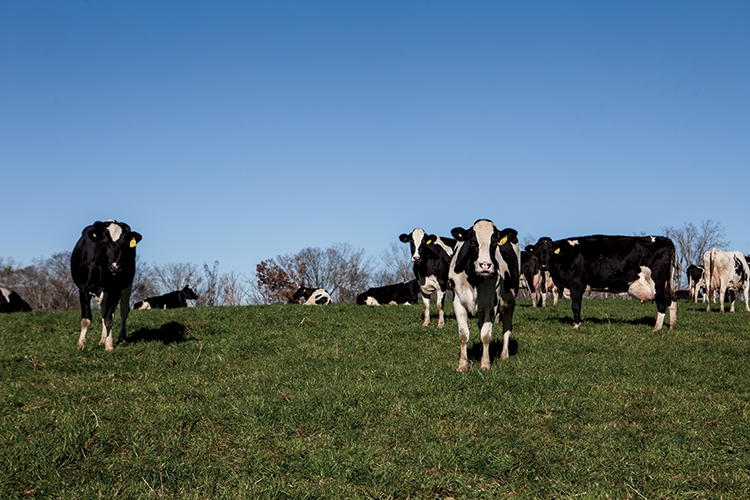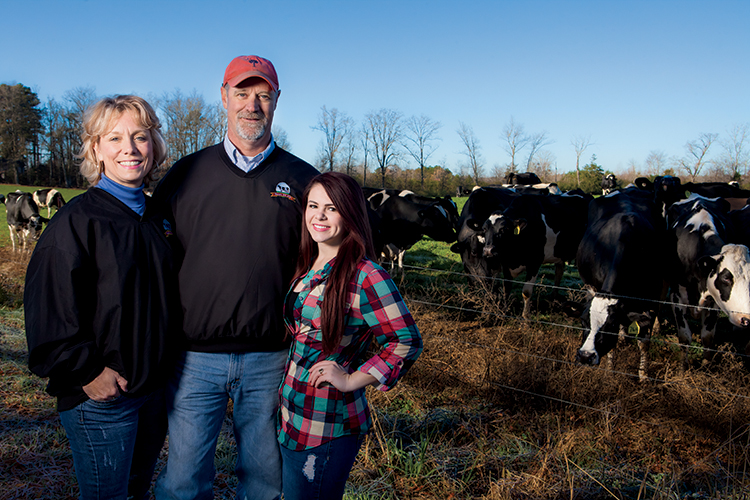Home > South Carolina > South Carolina Crops & Livestock > Holy Cow: South Carolina Dairy is Thriving
Holy Cow: South Carolina Dairy is Thriving

Dairy products are consumed in nearly every American family in the form of milk, cheese, yogurt, butter or ice cream. And South Carolina’s 75 dairy farms are working hard to make sure dairy products are always available for consumers, whether you choose to buy them at the grocery store or fresh from the farm.
Satterwhite Farm LLC
Kevin Satterwhite is a fourth-generation farmer at Satterwhite Farm in Newberry. Along with his dad, Wayne, uncle, William, and cousin, Steve, Kevin Satterwhite farms 3,000 acres and milks 1,200 cows in a 60-stall rotary milking parlor. Theirs is the second-largest dairy in the state.
“Our farm started in 1935, and I’m proud to be able to continue to farm the land my great-grandfather did,” Satterwhite says. “I look forward to future Satterwhite generations returning to our family farm.”
Satterwhite and his wife Jennifer have two sons, Dylan, 10, and Austin, 8, who are already learning the ropes.
“They enjoy being on the farm and helping me sort the cows,” Satterwhite says. “I’m teaching them as I go.”
Satterwhite’s dairy is unusual, because instead of sending milk to a bulk storage tank for cooling, it goes directly from the cow through refrigerated pipes, where it cools to 35 degrees, and onto a refrigerated transport tanker.
Now more than ever people want to know that their food was grown in a responsible manner. In their quest for knowledge they sometimes find untruths from unreliable sources. For example, consumers often hear about antibiotics and hormones in their milk and dairy products.
“Dairy farmers are not allowed to inject dairy cows with any hormones,” Satterwhite says. “And we test our milk loads before they leave to make sure they are antibiotic-free. Then the first thing a milk plant does when the milk arrives is check it again before they even unload it. If anything shows up in their tests, the entire milk load is immediately dumped.”
Farmers treat sick cows just like you would treat a sick member of your family. If any medicine is given, all milk from that cow is discarded for a period of time to ensure there is no residual amount remaining. Healthy, content animals are simply good business for farmers, and providing the best care possible is top priority. Satterwhite wants consumers to have confidence that dairy farmers hold the well being of their animals, and the safety of the consumer, in the highest regard.
“Dairy farmers work hard to take good care of our animals,” Satterwhite says. “Healthy, happy cows produce the most milk, so we always give them the best care possible.”

Hickory Hill Milk
At Hickory Hill Milk in Edgefield, Watson and Lisa Dorn milk 250 cows on the same land that has been in Watson’s family since 1764. Their son Daniel, a junior at Clemson University, plans to return to the farm after graduating. Their daughter Courtney is a high school senior who helps on the farm, too.
“About 10 years ago, we decided to do things differently and started our own bottling plant here on the farm,” Dorn says. “People like being able to buy milk produced locally, and the Certified South Carolina label has been huge for us.”
Hickory Hill Milk bottles 90 percent of the milk it produces and sells it through distributors all over South Carolina, North Carolina and Georgia, as well as in Whole Foods and Fresh Market stores. Hickory Hill is one of only two South Carolina dairies that bottles its own milk. They also process milk for Clemson Blue Cheese, a product the university has been making since 1941.
Dorn says it saddens him to see bad publicity about animal welfare in agriculture.
“People need to realize these cows take care of us, so we have to take care of them,” he says. “Farmers were the original environmentalists. If we don’t take care of our resources, we’re not going to be here long.”
Worley Lane Farms
In Nichols, Worley Lane Farms is a different type of dairy, with goats instead of cows. Cindy Worley Howell and her husband Tim, a banker, bought their first two goats in 2011, so they could pass the farming tradition and values of their 365-acre farm on to their five children.
They became certified to sell their Grade A goat milk. As their herd grew, they were getting so much milk they began making goat’s milk soap, which is praised for its moisturizing qualities.
“I began experimenting with making goat cheese at home and sent it with my husband to work,” Cindy Howell says. “Everyone loved it so much that we got licensed to sell the cheese, too.”
The family now has 19 goats and sells the milk, soap and cheese at the North Myrtle Beach Farmers Market and the Conway Farmers Market from May through October. Or customers can buy it straight from the farm. Their goat cheese, or chèvre, comes in three flavors – classic, Honey Lavender and Roasted Red Pepper – and they also make ricotta cheese.
Howell enjoys seeing her customers face-to-face and letting them know where their food comes from.
“I’ve loved seeing how much our customers love our cheese. The Roasted Red Pepper is a sellout every time,” she says. “I enjoy being on the farm, working with the goats to produce a product with our family. We belong to the land; it doesn’t belong to us. And we know we’re doing something right, because it’s working.”



